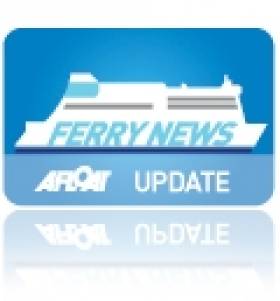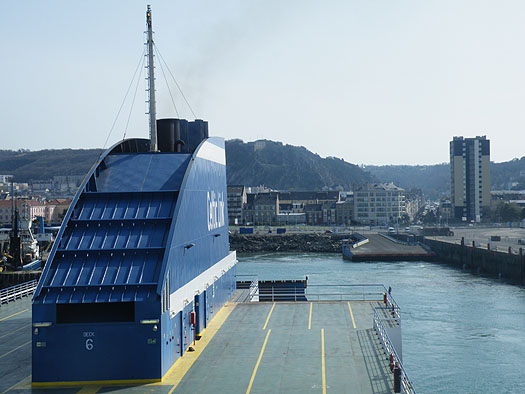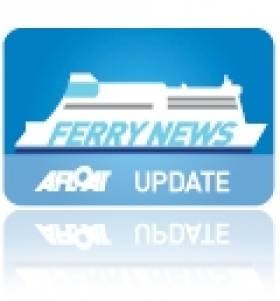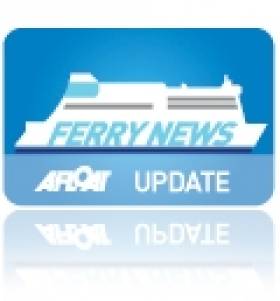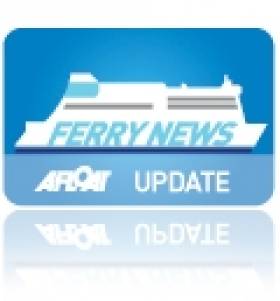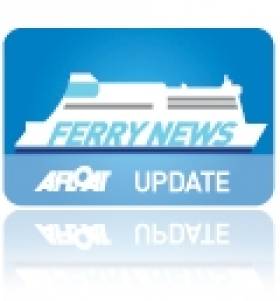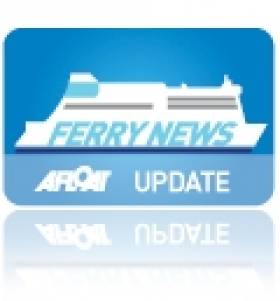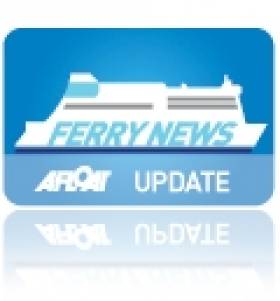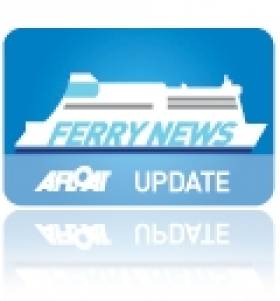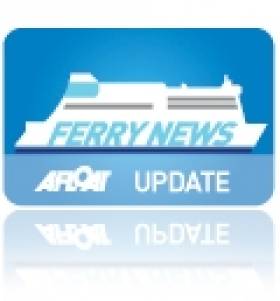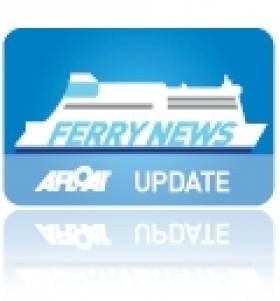Displaying items by tag: Celtic Link Ferries
#FarewellCelticLink - Celtic Link Ferries final farewell sailing arrived into Rosslare this morning from Cherbourg, marking an end of the era as the Wexford based company are been acquired by Stena Line with effect today, writes Jehan Ashmore, who travelled on board the ro-pax Celtic Horizon.
The last crossing was in command of Captain Richard Collins and his crew of 50 that operate services on board the 27,522 tonnes Visentini shipyard-built ro-pax. The 17-hour continental route will continue to maintain a sailing schedule of three return-crossings weekly when Stena Line rename the vessel for their first sailing tomorrow.
As Celtic Horizon bade farewell to Cherbourg yesterday afternoon, she cast her moorings alongside the former trans-Atlantic liner terminal, now the maritime and undersea exploration visitor attraction 'La Cité de la Mer'.
On board Celtic Horizon where excited French teenage students that occupied the uppermost deck drenched in 18-degrees sunlight and to the sound of the ship's horn marking her final departure.
Asides the countless coach based students that have travelled since Celtic Link began reinstating the service in 2005, after P&O Ferries abandoned the route the previous year, the company has catered for a diverse market that includes passengers on foot and in cars, camper-vans and motorcyclists.
In respect to freight, this involved un-accompanied freight-units and trucks notably carrying livestock trade, in which 18 such large trucks were conveyed on yesterday's sailing to Cherbourg during the busy calve season. Over the years there have been contracts to import French manufactured trade vehicles.
Of primary importance is fish exports to French, Spain, Italy and beyond, this was one of the major reasons why the owners of Celtic Link, the O'Flaherty brothers (and local investors) who operate a fish processing plant in Kilmore Quay and fleet of more a dozen trawlers purchased P&O's service.
Celtic Ferries departs Cherbourg Photo Jehan Ashmore
The deal had involved the route's existing freight-vessel European Diplomat, which incidentally formed part of the Falklands Task Force in 1982, however as Celtic Link's 'Diplomat' she served a limited passenger service for Celtic Link. She was displaced by ro-pax Norman Voyager which last week started new Brittany Ferries Économie services.
In 2011 Celtic Horizon which is the same ro-pax design of Norman Voyager, entered service on a five-year charter from the Italian shipyard owners to Celtic Link.
Celtic Horizon became the first and only vessel during the last nine years of the ferry company to be given a name reflecting her trading route and her owner's brand name displayed on her funnel.
Watch this space... with further reports from Afloat.ie's dedicated Ferry News section.
Ferry Free Furry Travel to France
#FreePetTravel - Celtic Link Ferries are transporting pets free-of-charge between Ireland and France.
The Irish owned ferry company operating on the Rosslare-Cherbourg route is giving passengers a choice of bringing their pets which can be kept in kennels supplied on board or in the passenger's vehicle.
Passengers will be able to visit their pets in kennels throughout the sailing and for those pets kept in their vehicle, they must visit under crew supervision. For further details visit their Link.
The route's ro-pax vessel Celtic Horizon sails from Rosslare to Cherbourg every Tuesday, Thursday and Saturday and sails from Cherbourg to Rosslare every Wednesday, Friday and Sunday.
Following Irish Rugby Triumph, Celtic Link Ferries Final St. Patrick’s Crossing Sets Sail before Stena Acquisition
#StPatricksSailing – Following Ireland's rugby triumph of the Six Nation's Championship yesterday in France, Celtic Link Ferries final promotional €1 crossing for St. Patrick's Day, has set sail this afternoon from Cherbourg to Rosslare, writes Jehan Ashmore.
As previously reported, Stena Line in February announced that they were to acquire Celtic Link, the Wexford based single-ferry operator, which only introduced the chartered Italian built and flagged ro-pax ferry Celtic Horizon in 2011. The 1,000 passenger, 200-car, 120 freight-unit vessel will continue serving the 17-hour Ireland-France link, a first for Stena Line which are to acquire the company's business on the route, with effect from 31 March.
In the meantime, there will be no doubt be a celebratory mode on board Celtic Horizon, on foot of the sporting success in the Stade de France venue outside Paris, combined with the Irish national day.
Among the passenger facilities on the overnight ferry are the Cherbourg Café, Tuskar Rock Bar and Lounge, a restaurant, cinema lounge and souvenir kiosk shop and accommodation in 2,4 and 6 berths cabins plus luxury suites.
To gain a further insight into the day to day running of the Celtic Horizon, built by Cantiere Navala Visentini shipyard in Portoviro, you can read an interview about one of her masters, Captain Richard Collins, by clicking this 'link' to a feature published in Ships Monthly.
Celtic Horizon is the only vessel of the company to have been clearly given a name directly associated with her owners trading route.
Her predecessors were Norman Voyager, another Visentini ro-pax of the same design and recently renamed Etretat for Brittany Ferries 'Economie' services and freight-ferry Diplomat which was scrapped in recent years.
She was the first vessel to launch operations for Celtic Link in 2005 following P&O Ferries withdrawal on the continental route the previous year.
Half-Price Cabin Sale with Celtic Link Ferries
#HalfPriceCabins – Celtic Link Ferries are currently running a half-price cabin sale between Rosslare and Cherbourg served by the ro-pax, Celtic Horizon, writes Jehan Ashmore.
"It's just our way of making travelling to France easier" said a company spokesperson.
Celtic Horizon provides passengers a choice of 2-berth, 4-berth, 6-berth and luxurious suite cabins. These three suites are situated overlooking the bow. Cabins in all categories come with en-suite facilities and the beds in each cabin are full-sized.
The half-price cabin sale is subject to terms and conditions, noting only applies to new bookings and are not applicable to bookings taken in June, July or August.
The company claim, Celtic Horizon operates more crossings between Ireland and France than any other ferry by sailing to a thrice weekly return sailing schedule.
She sails Rosslare-Cherbourg every Tuesday, Thursday and Saturday and returns from Normandy by departing Cherbourg on every Wednesday, Friday and Sunday respectively.
For further information visit: celticlinkferries.com/category/offers
Stena Line Acquire Celtic Link Ferries Direct Continental Route
#StenaBuyCeltic- Stena Line has acquired the Irish-owned Celtic Link Ferries service which operates the Rosslare-Cherbourg route.
Celtic Link currently provides a three times weekly service between Ireland and France with the MV Celtic Horizon, which can accommodate 1 000 passengers, 200 cars and 120 freight units.
Ian Davies, Stena Line's Route Manager (Irish Sea South) said: "The acquisition of the Rosslare-Cherbourg route is a key strategic investment for Stena Line and one which will help stimulate and strengthen new and existing opportunities for trade and tourism between Ireland, France and beyond. With confidence in the Irish economy strengthening, we see positive long term growth in tourist and freight traffic from the Continent as a real opportunity to help strengthen this economic growth further. The Celtic Horizon will continue to operate a year- round service and we look forward to introducing the Stena Line experience to the vessel for our customers to enjoy."
Michael McGrath, Stena Line's Chief Operating Officer commented: "This exciting investment represents an important milestone for Stena Line as for the first time in our history we will be able to offer a direct ferry link between the Republic of Ireland and the Continent. We believe we can bring significant added value to the route with our wealth of industry experience and award winning customer service standards which we are confident will help to stimulate increased traffic volumes in the future."
The all year round service currently operates three weekly sailings from Rosslare at 21.30 on Tuesday and Thursday with a Saturday sailing at 16.00. From Cherbourg the schedule is 21.00 on Wednesday and Friday with a Sunday sailing at 16.00 with a journey time of approx 17 hrs.
Final details are currently being concluded around the acquisition and Stena Line hopes to be in a position to take over the running of the service with effect from Monday 31st March 2014.
Sail to Ireland for St. Patrick’s Day and for Only €1
#SailStPatrick - A month to St. Patrick's Day and Celtic Link Ferries are offering a special €1 France-Ireland deal for the sailing on Sunday 16th March.
Passengers will have the opportunity to travel on board Celtic Horizon between Cherbourg-Rosslare with any tourist vehicle (car, van [up to 6.5m long and 2.5m high], motorhome, motorcycle, caravan, minibus or trailer) for as little as €1.
The promotion also includes everybody that is in the vehicle on the sailing that departs Cherbourg at 16.00hrs and arrives on the morning of St. Patrick's Day at 09.00hrs.
"Its simply an effort to get as many people to come to Ireland for St. Patrick's Day as possible" said a company spokesperson. We have more direct crossings than anybody else and with that we want as many people to use it as possible".
Celtic Link Ferries to Launch Improved Sailing Schedule for 2014
#ImprovedSchedule - Celtic Link Ferries Rosslare-Cherbourg route vessel, Celtic Horizon is to launch an improved sailing schedule in 2014, following a period of maintenance at Swansea Drydocks, writes Jehan Ashmore.
Currently the 27,522 tonnes ro-pax ferry is docked at the South Wales ship repair and recycling facility and is due to return to the Rosslare-Cherbourg route sometime between 11 and 14 January 2014. When the 1,000 passenger capacity vessel resumes service, the revised sailing schedule is to bring a more customer friendly schedule.
Celtic Link Ferries will now arrive and sail earlier on the weekend sailings. The improved sailing times will now provide customers to arrive earlier in port for the onward destination in France or Ireland.
"Celtic Link Ferries wants to give its passengers more opportunity to drive during delight hours at the weekend" said the company's Tourist Passenger Manager, Rory McCall.
"The most commonly issued request from our customers is to arrive and to sail earlier between Ireland and France, now we will do that".
Celtic Horizon will now sail at 21:00 on Friday night (local time) from Cherbourg, at 16:00 from Rosslare on Saturday and at 16:00 (local time) from France on Sunday.
The low-fares Irish owned ferry company will continue to operate more direct sailings between Ireland and France than any other company sailing on the direct services to the continent.
Catch the Last Ferry to France and Return Home for Christmas
#ChristmasFerry - Celtic Link Ferries are operating the last sailing between Ireland and France before Christmas with a sailing on Saturday 21 December departing at 18:00.
The low-fares ferry company sail directly between Rosslare and Cherbourg. So to catch this ferry to France and return back home for Christmas, there will be still plenty of time to spare.
"Celtic Link Ferries want to give passengers as much opportunity to travel as possible" said Tourist Passenger Manager, Rory McCall. "Christmas is a special time where people are eager to get where they need to go".
The ferry 'Celtic Horizon' will return back to Rosslare after leaving Cherbourg on Sunday night at 19:00 (local time). Customers intending on travelling leading up to the festive season are encouraged to book early as cabin availability is limited.
French Routes Ro-Pax Rival Sisters Meet in Rosslare Harbour
#NewFerry – Irish Ferries chartered ro-pax Epsilon called to Rosslare Europort from Cherbourg this morning, her arrival to Irish waters follows a repositioning voyage starting almost a week ago from Sicily, writes Jehan Ashmore.
Under the command of Captain Paul Sellers, Epsilon approached the Wexford ferryport from where Irish Ferries Pembroke Dock bound Isle of Inishmore vacated her berth for the newcomer.
Ironically at the adjacent berth to where Cartour Epsilon (2011/26,325grt) berthed was Celtic Horizon (2006/27,522grt) of Celtic Link Ferries which in 2011 entered service on their service to Cherbourg. She is a sister and former fleetmate which as Cartour Beta also served Italian operator Charonte & Tourist.
Epsilon's call to the Wexford port was likewise to Cherbourg to carry out berthing trails when Irish Ferries requires relief cover on southern services.
She is due to make the final leg of her journey to Dublin Port to where the ro-pax ferry is to enter service on the Holyhead route this week and in the New Year launch a new Dublin Port-Cherbourg route.
Also berthed in Rosslare Harbour was Stena Europe, the Fishguard route ferry which was fresh from annual maintenance following dry-docking in Birkenhead.
Celtic Link Ferries Support Chernobyl Ireland
#FerryChernobyl - Celtic Link Ferries are delighted to support Chernobyl Ireland Humanitarian Aid as the charity continue to help the children of Grozovo School in Minsk, Belarus.
The ferry operator would like to take the opportunity to wish Chernobyl Ireland continued success in their tireless mission to provide food and water, comfortable living conditions, and other supplies to children who really need it.
If you would like to become a volunteer or host a child through Chernobyl Aid Ireland, contact: 051-858944 or for further information visit: www.chernobylaidireland.ie/
Celtic Link Ferries operate three round-trip sailings weekly between Rosslare and Cherbourg which is run by the ro-pax vessel Celtic Horizon.


























